Content
- 1 Why do children take Omega-3
- 2 At what age can a child be given Omega-3
- 3 How to choose Omega-3 for kids
- 4 The daily norm of Omega-3 for children of different ages
- 5 How to give Omega-3 to children
- 6 The best Omega-3 supplements for children
- 7 What foods contain Omega-3
- 8 Overdose and contraindications
- 9 Conclusion
- 10 Reviews of vitamins with Omega-3 for children
For a full-fledged mental and physical development, normal study, a sufficient intake of Omega-3 is necessary. The structure of the nutrient is composed of polyunsaturated fatty acids. With a deficiency of a useful substance, pediatricians recommend taking additional drugs with Omega-3 for children.
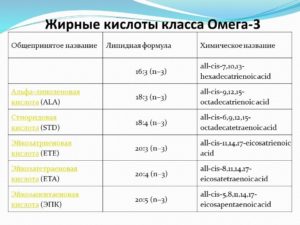
Why do children take Omega-3
The child's body needs minerals, vitamins and Omega-3 acids. It is known that a deficiency of fatty acids can lead to delays in intellectual and physical development. Children who consume insufficient amounts of Omega-3 often suffer from bronchitis, sore throat and other respiratory diseases.
PUFA (polyunsaturated fatty acids) are essential for the development of the child's body. The nutrient is directly involved in the stabilization of the psycho-emotional state. Omega-3 includes the following essential acids:
- DHA - docosahexaenoic;
- EPA - eicosapentaenoic;
- ALA - alpha linolenic.
The main functions of PUFA include:
- increased resistance to pathogenic microorganisms;
- strengthening of immunity;
- acceleration of the body's recovery after illness.
The combination of Omega-3 with the following vitamins brings benefits:
- D;
- E (tocopherol);
- A (retinol).
The complex of vitamins and Omega-3 contributes to:
- maintaining the adequate functioning of the organs of vision;
- improving the condition of the skin;
- the formation of teeth and bones;
- normalization of the heart;
- stimulation of muscle fiber growth;
- improving concentration.
- brain tissue;
- blood vessels;
- hearts.
Lack of Omega-3 disrupts the formation of dental tissues. A deficiency usually presents with the following symptoms:
- sleep disturbance;
- apathy;
- nervousness;
- irritability;
- increased excitability, emotional instability.
Omega-3 supplementation improves the mental capacity of the child by increasing the blood supply to the brain. Useful substances contribute to the formation of new connections between neurons. PUFAs reduce anxiety, prevent hyperactivity due to the sedative effect. Regular intake of the nutrient enhances immunity, ensures adequate development of the visual analyzer. Taking Omega-3 prevents dry eye syndrome, which is often observed when using modern gadgets in children at school age.
At what age can a child be given Omega-3
Pediatricians recommend taking a dietary supplement from the age of 3. This is due to the active growth of the body in a given age period. However, there are drugs specifically designed for children during infancy.
The intake of a nutrient in the body depends on the type of food. Babies who are breastfed under 1 year of age receive Omega-3 in breast milk.Women during the lactation period should pay attention to a balanced diet. With artificial nutrition, the nutrient is supplied as part of the mixture.
Fish oil containing PUFA can be given from 2 years old. However, the risk of allergic reactions should be considered. The intake rate of Omega-3 at the age of 3-14 years is 12 g per day. The inclusion of fish and fresh vegetables in the daily diet does not meet the needs of a growing body. That is why experts recommend taking dietary supplements.
How to choose Omega-3 for kids
To choose drugs with Omega-3 for children, you should focus on these criteria:
- DHA concentration. Omega dosage for children 4 years old is 200 mg DHA per day. At 3 years of age, the intake rate of this component is 145 mg. The dose of Omega-3 for children 7 years old is 220 mg.
- Possibility of use in childhood. As a rule, this information is indicated on the packaging.
- Lack of Omega-6 and other active ingredients.
The daily norm of Omega-3 for children of different ages
Nutrient intake rates vary significantly from country to country. Russian experts call the following dosages of Omega-3:
- 500 mg - up to 12 months;
- 700 mg - 1-3 years;
- 900 mg - 4-8 years;
- 1000 mg - 9-13 years old;
- 1200-1600 mg - 14-18 years old.
The difference in the intake of a useful substance is due to the peculiarities of the diet. According to research, 80% of children lack PUFA.
How to give Omega-3 to children
Allergic reactions are rare when using nutrient-containing vitamins for children. Dietary supplements can have the following dosage forms:
- syrups;
- chewable lozenges;
- tablets;
- capsules.
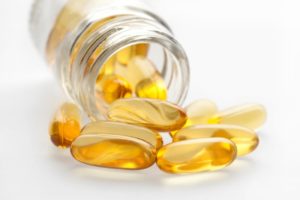
A dietary supplement in liquid form is prescribed for children with difficulties in swallowing capsules and tablets. The required amount of syrup is poured into a measuring spoon. It contains a daily dose of the drug. Capsules and tablets are intended for older children. The drugs should be taken with meals.
Usually, the duration of admission is 30 days, after which you need to take a break. After 2 months, the intake of dietary supplements can be resumed.
Chewable lozenges are vitamin complexes with a pleasant taste. They include not only PUFA, but also other useful components. Lozenges are often produced in interesting shapes and taste like candy.
The best Omega-3 supplements for children
It is advisable to purchase dietary supplements after consulting a doctor. The dosage is also prescribed by a specialist.
Wellness kids
The drug is manufactured by Oriflame. The dietary supplement is represented by syrup, which can be used by children over 1 year old. Wellness Kids also contains:
- fish fat;
- antioxidants;
- lemon oil;
- tocopherol.
The average dosage is 5 ml. The advantage of the drug lies in the content of exclusively natural ingredients. Omega-3 has no significant contraindications and is easily absorbed.
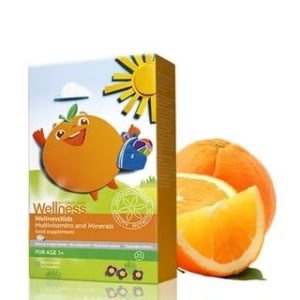
Smart Omega
The dietary supplement differs in the form of chewable tablets. The drug includes:
- retinol;
- fish fat;
- calciferol;
- ascorbic acid;
- fish fat;
- beeswax.
Omega-3 can be taken by children from 3 years old. The instructions for use indicate the following dosages:
- 1 tablet (3-7 years old);
- 2 tablets (7-14 years old).
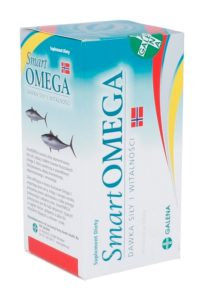
Supradin KIDS with Omega-3
The preparation in the form of lozenges contains choline, nicotinamide, DHA and vitamins:
- AT 6;
- AT 12;
- FROM.
Supplements are recommended to be taken in the autumn-winter season in order to strengthen the immune system. The use of the product is contraindicated under the age of 3 years.
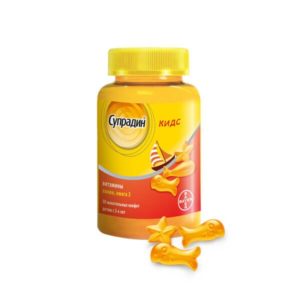
Multi-tabs Omega-3
Children's vitamins with Omega-3 are produced in the form of syrup. It is a quality dietary supplement that contains both DHA and EPA. Other components include:
- retinol;
- folic and ascorbic acid;
- cobalamin;
- calciferol.
The dosage is 5 ml per day.
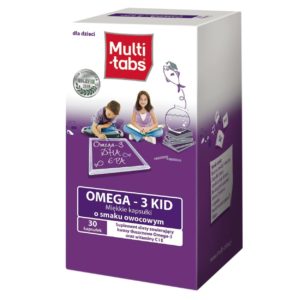
Pikovit Omega-3
The syrup contains the following substances:
- pyridoxine;
- calciferol;
- fish fat;
- ascorbic acid;
- thiamine;
- cobalamin;
- tocopherol;
- dexpanthenol;
- folic acid.
The drug with Omega-3 is intended for children from 3 years old. Syrup should be taken in a dosage of 5 ml per day.
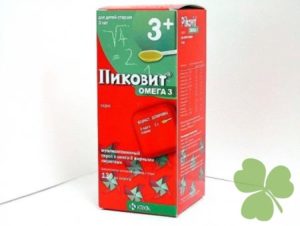
What foods contain Omega-3
Beneficial nutrients include the following foods:
- vegetable oils (linseed, hemp, cedar);
- seafood (cod, mackerel, salmon, herring, caviar);
- nuts and seeds (linseed, walnuts, pumpkin, pine);
- vegetables and herbs (mint, spinach, basil, avocado, cabbage, lettuce, garlic);
- meat (lamb, chicken, beef).
It is good for children to eat dairy products that also contain Omega-3s.
Overdose and contraindications
Pediatricians note that cases of overdose are extremely rare and are usually caused by excessive intake of dietary supplements containing fatty acids. The dosage of the drug taken must be monitored so as not to harm the child's body.
When an overdose occurs in children, the following symptoms appear:
- disruption of the gastrointestinal tract: diarrhea, nausea, epigastric pain;
- lowering blood pressure;
- pathological changes in blood clotting.
The use of a nutrient can provoke allergic reactions in case of intolerance to certain foods:
- itching;
- rashes;
- peeling;
- lacrimation;
- laryngeal edema.
Taking fatty acids is contraindicated in the following cases:
- allergic reactions to fish oil (or fish);
- pathology of the liver and stomach;
- impaired renal function and blood clotting;
- cholelithiasis;
- tuberculosis;
- hypervitaminosis;
- pancreatitis;
- cholecystitis;
- hyperthyroidism.
Conclusion
Dietary supplements with Omega-3 for children make it possible to compensate for the deficiency of nutrients. The nutrient is involved in the development of intelligence, improves vision, protects the child's body from viruses and bacteria. Fish oil for children, including Omega, has a positive effect on the psycho-emotional state of the child.

